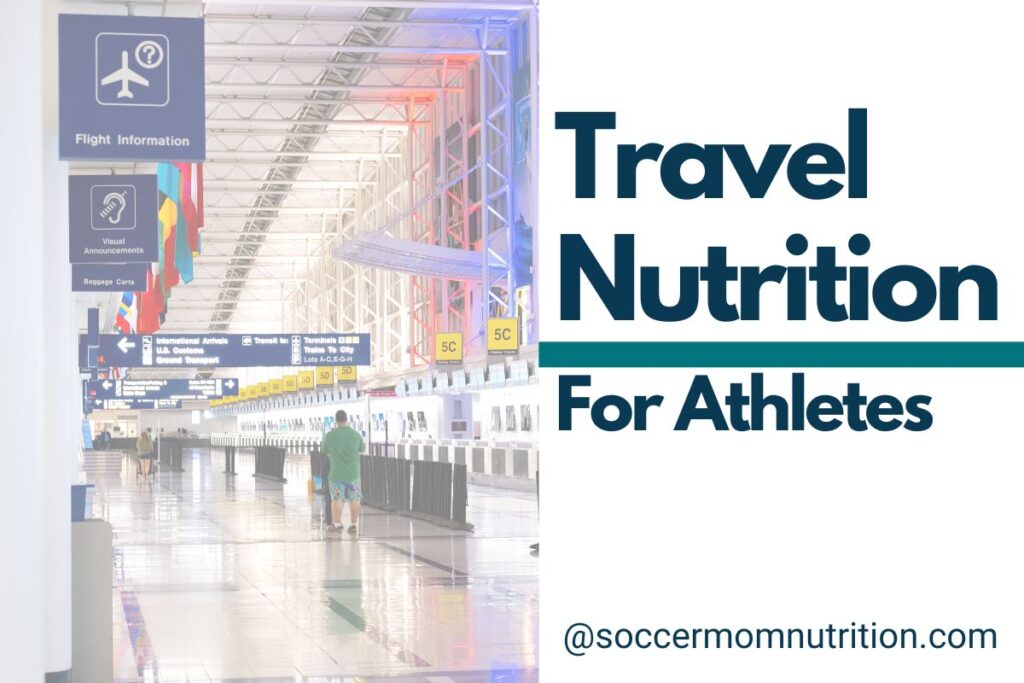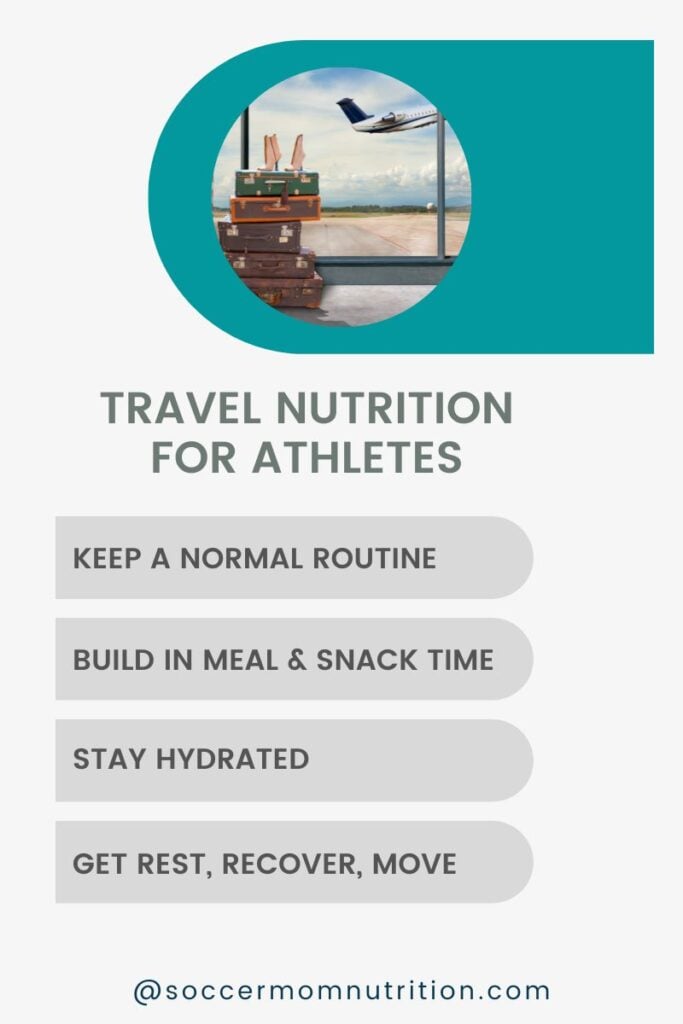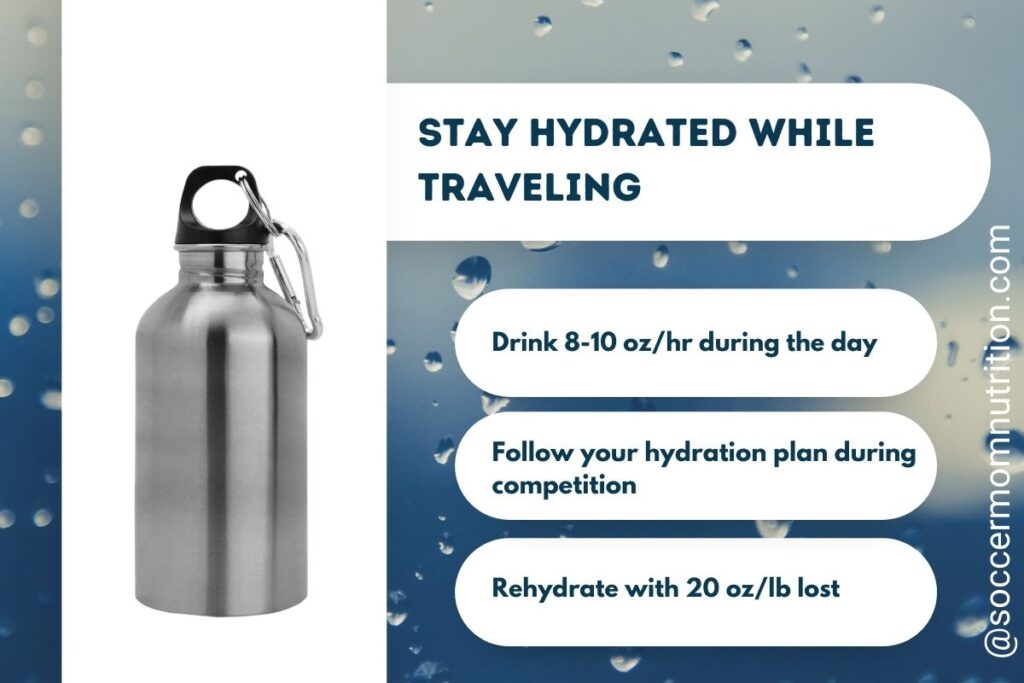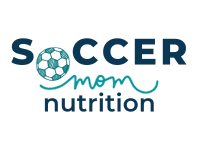Travel Nutrition for Athletic Performance
Having a travel nutrition plan will help athletes to eat healthy and consistently while traveling.
Instead of reaching for the quickest snack or missing meals and calories, a travel nutrition plan ensures athletes know what and when to eat, which foods work best and what they need to pack to meet their needs.
It takes planning and practice to learn the routines and habits to maintain a sports nutrition performance nutrition plan even while on the road.
But we’ll give you some easy tips to follow to make it simple.

Why a travel nutrition plan is important for athletes
Traveling athletes may be challenged to find nutrient dense and carbohydrate rich meals and snacks to fuel their performance. Without an adequate travel nutrition plan, they might reach for the most convenient foods.
Instead, we want to focus on eating right to set them up for success during their game.
Generally those types of foods found at convenience stores, delis, bakeries can be high in fat, sugar, saturated fat and lacking the nutrients and energy an athlete needs to fuel or recover.
When a travel nutrition plan isn’t followed, athletes are at risk for not meeting their energy and calorie needs, reducing their ability to perform optimally on game day (1).
And during this time, top performance at a tournament or competition is their main goal.
Additionally having a travel nutrition plan in place ensures that you plan for foods that athletes typically eat on game day. This way, athletes aren’t trying new foods that may not sit well during your event.
Goals for a travel nutrition plan for athletes
- Keep your routine as normal as possible
- Build in meal and snack times around competitions and trainings
- Stay hydrated
- Get adequate rest, recovery and movement
When you’re traveling, you want to stick to familiar foods and routines. Now is not the time to test out the latest sports bar on the grocery shelf or craziest menu item at a restaurant. Rather, that’s what practices are for.
In your travel nutrition planning, you’ll want to build pre game meal and healthy snack times around competition and training. Additionally, athletes will be more susceptible to dehydration. So build into your plan time and availability of fluids to stay hydrated.
Lastly, traveling isn’t easy on most of us. Athletes in particular will need adequate rest for recovery. But they also need to get some movement so they are relaxed and ready to go.
Planning some light fun activities like team walks can ensure athletes aren’t just sitting around getting stiff and possibly mindlessly snacking.

A travel nutrition plan for travel day
Whether you’re traveling by plane or on the road, start your travel day off with a hearty carbohydrate rich breakfast with moderate protein and healthy fat.
This keeps you from getting too hungry and lets you recognize hunger cues so that you can make healthy choices. (2)
Traveling by airplane
When you’re traveling by plane, you’ll be more at risk for dehydration due to cabin pressure and especially if the flight is long. Dehydration may also lead to jet lag making you feel even more tired and less ready to compete.
Your travel nutrition plan should include a hydration plan so that you can consume adequate fluids throughout the day and prevent dehydration. Once you pass security, fill up your water bottle and start sipping right away.
Aim to drink at least 8 oz/hr while on the plane.
The best choices are water, sports drinks and fruit juices. Since caffeine may increase dehydration, you should avoid caffeinated sodas. Also, carbonation may cause stomach upset.
Additionally, pack easy to carry snacks like pretzels, beef or plant based jerky, trail mix, bagels, dried fruit and animal crackers.
Typically you can find some regular meal options after you pass through security. Use these healthy tips for fast food or healthy eating at restaurants guide to help you make good choices.
Generally items like sandwiches, wraps and snack packs are easy to tuck into a bag and carry on the plane.
Lately most airlines also offer some type of meal or snack pack and sometimes allow you to pre purchase. This way, you can take some time to figure out what will work best for you.
Traveling by road
Traveling by car or bus affords you more options for following a travel nutrition plan because you can stop to eat and rehydrate along the way. You’ll also be able to pack a cooler with healthy snacks, drinks and ingredients to build healthy meals.
Since you might have more flexibility on the road, you should try to keep your routine of having meals and snacks at regular times. You may decide to stop at a park and have a picnic, make a sandwich or enjoy some chilled snacks.
Or perhaps you’ll look for some healthy fast food options. Check out our fast food tips for athletes.
Sometimes grocery stores have better options in their pre-made sections. Convenience stores, gas stations or delis may have some healthy options and you can use our healthy snacks guide to help you find some good choices.
Additionally, athletes should aim to drink at least 8 oz/hr to maintain hydration.

What to plan for at the hotel
Even before you arrive at your hotel, the team manager or parents can plan ahead. Many hotels offer space for teams to gather for a meal.
Therefore, you could Google local options to find healthy restaurants where you can order ahead for delivery either buffet style or individual meals.
Since most tournaments work with hotels directly, you’ll likely be assigned to a hotel that offers breakfast. Hotel websites offer information about additional amenities such as microwaves, refrigerators and mini-kitchens.
After you’ve settled into the hotel and see what’s available, head out to the grocery store armed with our healthy snacks recommendations.
It’s never a bad thing to have a few shelf stable snacks in rooms and cars like pretzels, crackers, dry cereal, applesauce pouches and granola bars.
If you have a fridge, stock up on low fat greek yogurt, string cheese, hard boiled eggs and fruit.
Meal timing while on the road
Generally, once you have the foundation of your travel nutrition plan, you can follow the basic guidelines for pre game and post game meals. When you’re 3-4 hours out from a game, eat a hearty balanced meal focused on high carbohydrates and moderate protein.
The closer to game time, less protein, fiber and fat should be eaten and the focus should be on easy to digest carbohydrates.
After the game, have high carb and moderate protein snacks available for a quick snack until you can get back to the hotel or restaurant for a post game recovery meal.
Summary
You may experience some challenges following your performance nutrition plan on the road. However with good planning and following travel nutrition goals, you can minimize the disruptions that travel brings.
This way, day or night, you’ll have the foods available to fuel.
Remember to stay hydrated, listen to your hunger cues and have fun.
Stephanie Magill, MS, RD, CD, FAND has over 22 years of experience in public health and nutrition. As a performance registered dietitian nutritionist, Stephanie specializes in sports nutrition and provides simple and actionable information so that athletes can be well fueled for high performance on and off the field. Stephanie has a Master’s Degree in Nutrition and is a Fellow of the Academy of Nutrition and Dietetics.

